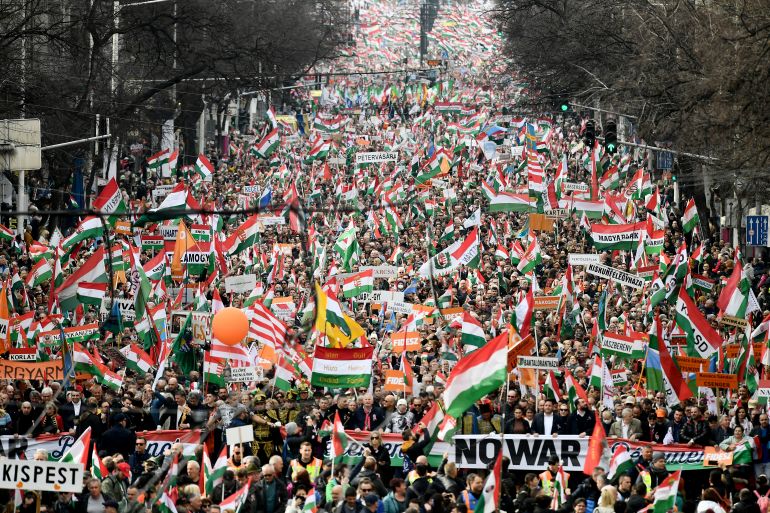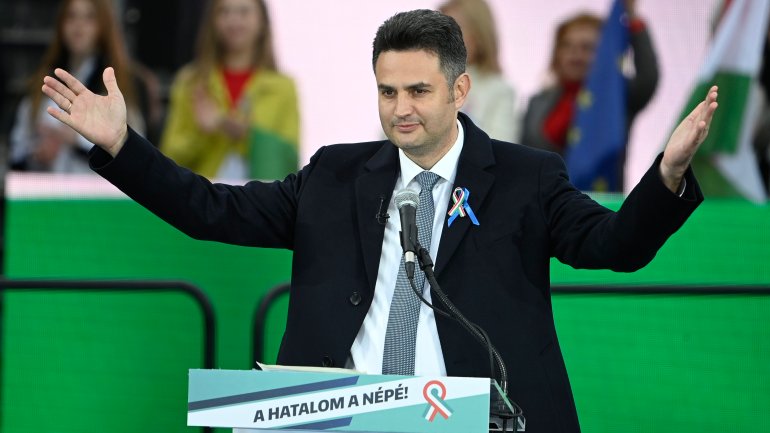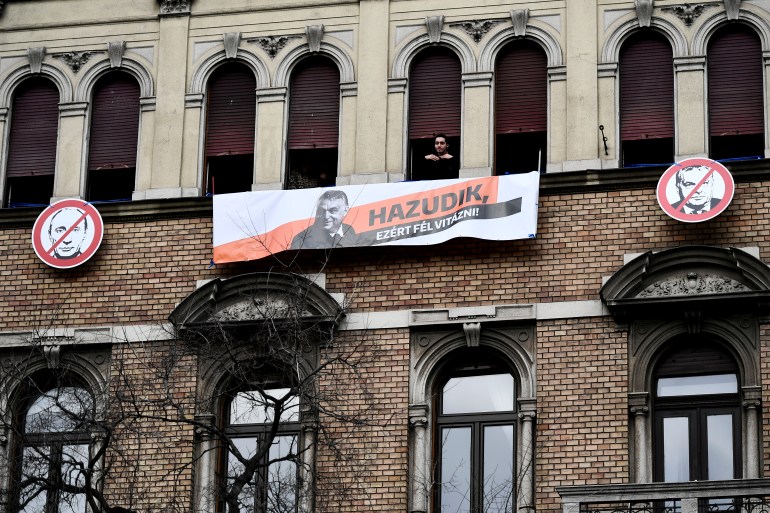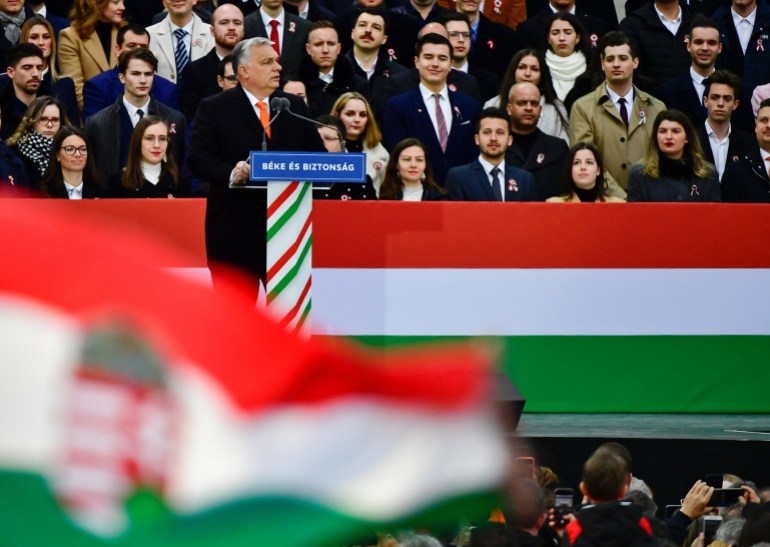Russia’s war in Ukraine dominates Hungary’s election campaign
PM Viktor Orban and his challenger adjust their campaign focus to reflect the Russian invasion in Ukraine.

Budapest, Hungary – Hungary’s March 15 Revolution Day has been a politically charged national holiday throughout the 12 years of Prime Minister Viktor Orban’s divisive populist rule.
But this year, the crowds filling Budapest’s streets were haunted by the horrors and uncertainty emanating from the war in neighbouring Ukraine.
Keep reading
list of 3 itemsHungary’s Orban defends response to Ukraine war refugees
Hungary elects Katalin Novak, first-ever female president
On the podiums, the mood was largely the same, as Orban, vying for a fourth consecutive term in the April 3 parliamentary vote, and his challenger sought to keep pace with events.
The illiberal prime minister’s Fidesz party this year converted the commemoration of Hungary’s 1848 revolution against Habsburg rule – complete with a vicious crackdown from Tsarist Russia – into a “peace march”.
Orban warned his supporters that they face a choice between “a pro-peace right or pro-war left”.

Peter Marki-Zay, the prime ministerial candidate for the six-party united opposition that is posing Orban his first domestic political challenge in more than 10 years, spoke of “a single historic choice: to choose Europe over the East, freedom over tyranny”.
This was not the script that either expected three weeks ago.
Orban’s campaign originally planned to focus on the LGBTQ referendum that voters will also be asked to consider at the ballot box, and other issues related to his long cultural war against liberals, migrants, the European Union and United States philanthropist George Soros.
The longstanding claims that Orban has used multiple terms armed with a constitutional majority to build a network of corruption and derail the rule of law had topped the opposition’s strategy.
But Ukraine’s dominance of the news cycle means that both these blueprints have been ripped up as the contenders scramble to react to the chaos spilling across the border.
East vs West
Russia’s aggression is particularly tricky for Orban, who has spent his rule earning the title of Russian President Vladimir Putin’s closest EU ally.
Budapest has continued to seek to avoid alienating the Kremlin. While the government did not veto Brussels’ sanctions, Orban insists Hungary will neither reduce its Russian energy reliance nor allow weapons heading for Ukraine to transit its territory.
This ambiguity has earned no little international scorn. Ukraine’s defence minister Oleksii Reznikov even pondered whether Hungarians remember the 1956 revolution, “when Soviet tanks trampled their freedom on the streets of Budapest and Hungarians asked the West for help”.
The opposition was quick to catch on. Its main campaign strategy is now to turn the election into a referendum on whether Hungary should head East or West, and therefore on Orban’s 12-year courtship of a Russian president now reviled as a war criminal and despot across much of Europe, if not the world.
“Orban and Putin or the West and Europe – these are the stakes. A choice between the dark or the good side of history,” Marki-Zay said.
“We’ve been questioning where Fidesz’s loyalties lie for years,” said Katalin Cseh, an MEP from Momentum, one of the six disparate parties that form the united opposition. “But this issue has become even more important now that people can see the destruction wrecked by Orban’s friends.”

It took a few days, but Fidesz is now firmly establishing its own narrative. In this scenario, Orban is hailed as the guarantor of peace and stability for Hungarians as the threat of war looms.
“Hungary must stay out of the war,” Orban told the peace march crowd. “We cannot get between the Ukrainian anvil and the Russian hammer.”
Orban must keep the war at arm’s length or admit that his pro-Russian strategy of the past 12 years was a mistake, said Dalibor Rohac, a senior fellow at the American Enterprise Institute.
As the Fidesz PR juggernaut has managed the U-turn, it has discovered further ammunition. Orban’s long rule is being highlighted in contrast with the inexperience of an opposition whose calls for showing greater support for Ukraine are now branded as dangerous warmongering.
And less than two weeks ahead of the election it seems that, with the help of the massed ranks of pro-Fidesz media, the ruling party’s strategy is starting to gain traction.
Fear of war
“Many Hungarians don’t like the direction of the country, but the fear of getting caught up in the conflict seems much stronger than the anger over Putin’s aggression,” Daniel Hegedus, a visiting fellow for Central Europe at the German Marshal Fund of the United States (GMFUS), told Al Jazeera.
“Poll movements since the invasion suggest that people are not ready to give their vote to an experimental political force,” he said.
Although close, polls have long suggested that Fidesz enjoyed a slender lead. The few surveys conducted since the Russian invasion suggest a rally-round-the-flag effect has added to Orban’s advantage.
“The war seems to be overwriting everything in the election campaign, except for the balance of power between contestants – for now, at least,” Robert Laszlo, a political analyst at the Political Capital think-tank, told Al Jazeera.
“The government’s communication chaos following the first days of Russia’s aggression against Ukraine seems to have passed,” he said.
Unsustainable
But there are other potential vulnerabilities that the opposition could yet exploit to reel Fidesz back.
The war is a clear risk to the economy, and in particular, the cheap energy prices that Fidesz has long instituted as a cornerstone of popular support.
With that in mind, Orban has explained that his refusal to break with Putin is driven primarily by heavy dependence on Russian energy. Hungarian households, he insists, must not be forced to “pay the price” of the war by seeing their utility bills rise.
Fidesz is seeking to hold back the immediate effects of the energy price spike ahead of the election, but price caps on motor fuels and basic goods are starting to strain the economy, and the value of the forint has plummeted.

The opposition says this illustrates that the government’s economic policies are simply not sustainable.
“They’ll try to hold this untenable position as long as possible, but they can’t hold back reality forever,” Cseh said. “People are starting to see that their money is worth less and less in the shops.”
But if the opposition is to really leverage such issues to finally end Orban’s rule, analysts say it must raise its game.
Orban’s adaptability
On the one hand, Orban’s illiberal political agenda has grown only more odious since February 24.
But amid the fallout from Ukraine, his unquestionable political skill, and most crucially his adaptability, are on full display.
A little luck can go a long way also, and time is on Orban’s side. He only has to keep the ship steady for a couple of weeks.
“The opposition needs to significantly accelerate the effort to mobilise their voters amid the chaos of the war,” Milan Nic, a senior fellow at the Alfred von Oppenheim Center for European Policy Studies (AOZ) of the German Council on Foreign Relations, told Al Jazeera. “They have very little time.”